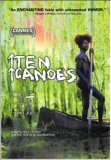| Reviews & Columns |
|
Reviews DVD TV on DVD Blu-ray 4K UHD International DVDs In Theaters Reviews by Studio Video Games Features Collector Series DVDs Easter Egg Database Interviews DVD Talk Radio Feature Articles Columns Anime Talk DVD Savant Horror DVDs The M.O.D. Squad Art House HD Talk Silent DVD
|
DVD Talk Forum |
|
|
| Resources |
|
DVD Price Search Customer Service #'s RCE Info Links |
|
Columns
|
|
|
Ten Canoes
In its telling of an Aborigine fable, Ten Canoes succeeds as both an entrancing entertainment and a fascinating ethnological study of Australia's Aboriginal culture. Director-writer Rolf de Heer deserves props for authenticity, using nonprofessional Aborigine actors speaking in their native language. That commitment translates into a sublime cinematic experience.
The Australian-made picture offers a story within a story. In voiceover, an English-speaking storyteller (David Gulpilil from Walkabout) introduces us to the beautiful hinterlands of northern Australia and a Ramingining tribe of a thousand years ago. In lovely black and white, de Heer presents the men as they go about building canoes so they can hunt for goose eggs. As they do so, tribal elder Minygululu (Peter Minygululu) acknowledges that his younger brother, Yeeralparil (Jamie Gulpilil, son of David Gulpilil), covets Minygululu's third and most attractive wife.
Consequently, Minygululu tells his younger brother a tale about a similar situation in the tribe's mythical past. We are transported to a world of lush color where a young tribesman named Dayindi (Jamie Gulpilil again) is hot for the youngest wife of his older brother, a brave leader named Ridjimiraril (Crusoe Kurddal). What unfolds, however, is no clear-cut parable. Our omniscient storyteller is ornery. Likening his tale to the ever-twisting branches of a growing tree, he takes the narrative into unexpected tangents complete with ominous strangers, sorcery, tribal warfare and potty humor.
Director de Heer gives the film a subdued, rolling rhythm that takes its visual cues from 1930s-era photographs taken by anthropologist Donald Thomson. The movie is visually gorgeous, with cinematographer Ian Jones drinking in the natural beauty of Arnhem Land in Northern Australia.
The film is playful, too. David Gulpilil's narration is wry and downright impish, while the tribesmen who populate Ten Canoes are decidedly familiar to modern-day audiences: They experience lust and jealousy, like to gossip, and can revel in a good fart joke.
Still, Ten Canoes is sometimes easier to admire than embrace fully. The film's languor lapses into tedium on more than a few occasions, and the story-within-a-story framework ultimately doesn't feel particularly necessary. But the movie still wins you over with its innovation and charm.
The DVDThe Video:
Presented in anamorphic widescreen 2.35:1, Ten Canoes boasts a flawless picture -- sharp details, vivid colors and no noticeable defects such as edge enhancement or pixilation. The only complaint I have is with the subtitles; white lettering can be tough-going when superimposed over a backdrop of tallgrasses shot in black and white. The DVD producers should have opted for the yellow subtitles used in the making-of documentary.
The Audio:Viewers can choose 5.1 Dolby Surround or 2.0 Stereo. The 2.0 is perfectly serviceable, but the former mix is excellent quality and makes nice ambient use of rear speakers.
Extras:The centerpiece of the special features is an outstanding making-of documentary, The Balanda and the Bark Canoes. Directed by de Heer, Tania Nehme and Molly Reynolds, it might even be more compelling than the movie itself, as it chronicles a dizzying array of challenges faced by the moviemakers -- not the least of which was requiring the entire cast to be nude in the film. In the process, the 52-minute doc provides an expansive understanding of Aboriginal customs and mores. Not to be missed.
Aerial map of Arnhem Land (3:05) is really more of a virtual tour of the area, incorporating nifty graphics and fluid camerawork to get a feel for this majestic region.
There are two supposed interviews that are really just outtakes from the aforementioned documentary: an interview with director Rolf de Heer (3:51) and an interview with co-director Peter Djigirr (4:07). Rounding out the supplemental material is a theatrical trailer and previews of other flicks.
Final Thoughts:Meditative and lyrical, Ten Canoes is something of an antidote to the hyped-up violence of Apocalypto. Director Rolf de Heer does a magnificent job memorializing the ancient customs of Aboriginal life in a way that is both entertaining and interesting. Perhaps best of all is the DVD's making-of featurette, a documentary that will give you greater appreciation of just what hurdles de Heer mounted to make this unique picture.
|
| Popular Reviews |
| Sponsored Links |
|
|
| Sponsored Links |
|
|
| Release List | Reviews | Shop | Newsletter | Forum | DVD Giveaways | Blu-Ray | Advertise |
|
Copyright 2024 DVDTalk.com All Rights Reserved. Legal Info, Privacy Policy, Terms of Use,
Manage Preferences,
Your Privacy Choices | |||||||













